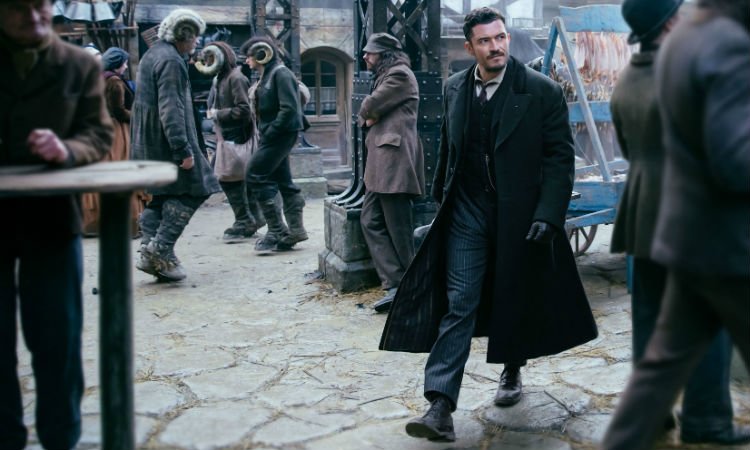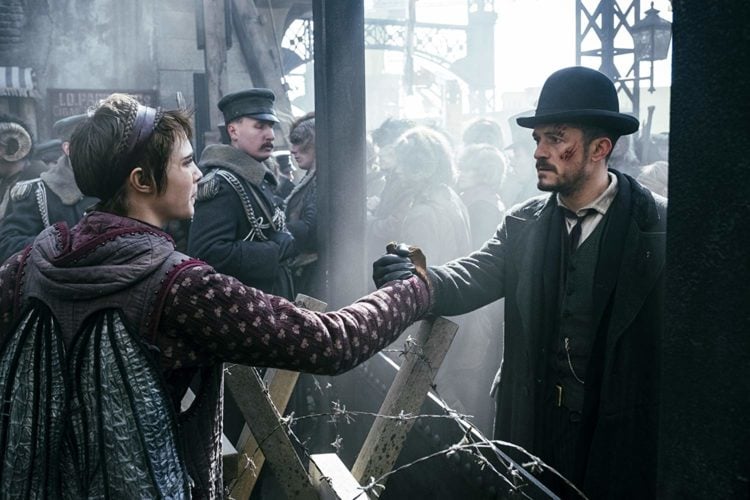
“Chaos creates opportunity.”
Season One of Carnival Row comes to a close with jaw-dropping secrets, untimely deaths, and a conclusion that will forever change the Burgue.
The moment Philo opened his eyes to see Absalom Breakspear before him, any question of his father’s identity was all but answered. Though Absalom is shaken by the revelation, the first and, sadly, last between father and son sheds light on Absalom and Aisling’s affair so many years ago. More than that even, Philo can relate to his father’s actions in the same way he allowed circumstance to end his own relationship with Vignette. Absalom tries to make amends for his self-ascribed cowardice, giving Philo his freedom and ensuring Vignette gets the same but, as fate would have it, the entire Burgue gets turned on its head.

(Photo: Jan Thijs – © Amazon Studios)
Before that happens though, Philo must confront Piety Breakspear and her Darkasher. Piety’s obsession to see Jonah achieve greatness was upset when she discovered the existence of Absalom’s bastard son. To ensure Jonah’s success, she must (in her mind, at least) take Philo out of the equation. Unfortunately, her assumption that this will change anything has a negative impact on the acceptance of her motivations.
Considering her longtime relationship with Haruspex, Piety should understand that prophecy doesn’t work that way; even the witch said as much regarding her own death. Not only does this damage her effectiveness as the antagonist but it dilutes much of the captivating mystery behind the Darkasher’s purpose.
Yet all is not lost as, despite the physical threat of the Darkasher behind Piety’s ministrations, the true mastermind is Sophie Longerbane. It’s not just how she sinks her claws into Jonah, convincing him that they can redefine their own legacy, but her letter impersonating Aisling set everything into motion. Piety’s assertion that Sophie is more dangerous than anything on the Row is all too accurate. Whether she has any affiliation with the terrorist sect of Fae worshipping the Hidden One remains to be seen but, considering her ability to orchestrate events behind the scenes, I wouldn’t doubt it.
Though there is still very little information on the Hidden One and the devout Pucks objective, their assassination attempt on the Chancellor creates the biggest shift in the Burgue’s already tenuous social climate. Though Absalom Breakspear has been a champion for Fae rights, when Piety murders him, Jonah is granted his father’s position. Falling prey to Sophie’s machinations, Jonah not only ignores the fact that they are siblings, he enacts the legislation that confines the city’s entire Fae population to the Row. The entire undercurrent of the series has been leading towards this though. I can say the end result is an unsatisfactory conclusion that, should the writes overly emphasize the disparity between classes and not maintain the strong character relationships in the future, could lead to a less than impressive sophomore season.
Finally, Fergus’s warning to Agreus that his relationship with Imogen was a dangerous affair comes to fruition when Ezra spies to two in the throes of passion. His attempt to kill Agreus feels less like a brother protecting a sister and more like a jealous lover. When Agreus defends her against Ezra’s assault, Imogen knows the trouble her paramour would be in—this is even before the proclamation that sequesters all Fae in the Row. The pair are forced to set sail from the Burgue and into parts unknown, though Ezra’s vindictive visage assures that he won’t let them live in peace.
When two favorite pairings end up together at the end, one would think that everything turned out aces. But that is not the case with “The Gloaming”. As a season finale, it did a fine job wrapping up the major throughline, in addition to the aforementioned couples finding one another and yet… something about it just didn’t satisfy. Piety’s mad obsession, culminating in her husband’s murder turned her from an interesting character with mystical (and dodgy) motivations to just a run-of-the-mill villain. The Fae internment, with its shades of the World War II treatment of Japanese citizens in the US, while making sense based on the show’s world, could be an albatross around the neck of Season Two’s narrative. Unlike some of the stronger episodes, “The Gloaming” was missing its heartbeat and the story arc felt more like ticking off items from a checklist rather than providing an emotional exploration of our characters’ circumstances. Be that as it may, it’s a decent ending to a very promising show whose future, if properly guided, could be extremely bright.
Fae, Hope, and Love
While the finale didn’t hit the notes I was looking for, it did provide an open-ended finish that creates all sorts of possibilities for season two. One thing that did satisfy was Philo’s narrative arc. For most of the series, he’s been a man walking between worlds, unable to feel at home in either. It’s taken years and plenty of disappointment but Philo has accepted the man he is, declaring “I am Critch” as he watched Fae rounded up into the Row. Though Vignette’s arc wasn’t quite as powerful as Philo’s she learned to let go of the pain (and anger) of heartbreak. Watching her friend shot from the sky though may spark the rebellious strength within her and something tells me that her best days as a character are ahead.
It’s sometimes difficult to tell fictional narratives that so closely parallels real-world social issues without coming across as preachy or overly critical. Carnival Row is a mixed bag in this regard, though it’s generally successful when it gave the characters a chance to question their own reality rather than throwing the injustice into our faces. I’m admittedly concerned that season two could fall into the overtly in-your-face trap if the writers aren’t careful but so long as they let the characters breathe, Carnival Row should be okay.
Finally, the mystery of the Darkasher expanded to something much deeper than it appeared. Though Piety Breakspear’s narrative end in the finale was disappointing, some of that was cleaned up thanks to Sophie Longerbane’s development. The big reveals of her character—that she and Jonah are siblings and her actions kick-started everything that happened with one simple letter—emphasizes that she is a very the competent antagonist. She’s the Littlefinger of this world, infatuated with chaos and pulling the strings in the background, always two or three steps ahead of everyone else. Though Jonah is ill-equipped to handle her on his own, the fact that he’s brought Millworthy onboard as his special advisor may even the odds as these sibling lovers look to create their legacy, likely at the detriment to the Burgue and all its citizens.
Carnival Row Finale:
![]()
Carnival Row Season 1:
![]()
